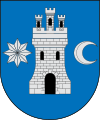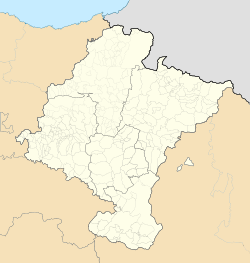Lumbier facts for kids
Quick facts for kids
Lumbier / Irunberri
Ilumberri
|
|||
|---|---|---|---|
|
Municipality
|
|||
|
|||
| Country | |||
| Autonomous Community | |||
| Province | Navarre | ||
| Comarca | Comarca de Lumbier | ||
| Area | |||
| • Total | 57.40 km2 (22.16 sq mi) | ||
| Elevation
(AMSL)
|
467 m (1,532 ft) | ||
| Population
(2018)
|
|||
| • Total | 1,317 | ||
| • Density | 22.944/km2 (59.425/sq mi) | ||
| Time zone | UTC+1 (CET) | ||
| • Summer (DST) | UTC+2 (CEST (GMT +2)) | ||
| Postal code |
31440
|
||
| Area code(s) | +34 (Spain) + 948 (Navarre) | ||
| Website | www.lumbier.es | ||
Lumbier (called Irunberri in Basque language) is a small town and municipality in the northern part of Spain. It is located in the autonomous community of Navarre, about 38 kilometers (24 miles) from Pamplona, the capital city. Around 1,400 people live there. Lumbier is special because it sits by the River Salazar in a beautiful natural area. It also has many interesting stories from the past!
Contents
The Name of Lumbier
People believe that Lumbier has been around since ancient times. Roman geographers like Pliny the Elder wrote about communities called iluberritani. Many think these ancient people lived where Lumbier is today. Roman ruins have been found in Lumbier. Also, parts of a Roman and Celtic villa were discovered nearby in Liédena.
Linguists (people who study languages) have figured out how the name Ilumberri changed over time:
- In Romance Languages (like Spanish): Ilumberri became Lumberri, then Lumbier.
- In the Basque Language: Ilumberri became Irunberri.
The meaning of Ilumberri likely comes from old Basque words. The first part, ilu, might be related to hiri or (h)ili, which means 'town' in Basque. The second part, berri, means 'new'. So, the name probably means 'new town'.
Today, Lumbier is in an area of Navarre where Basque is not commonly spoken. So, its Spanish name, Lumbier, is the official one. However, the name "Irunberri" is still used.
Why Some Call Them "Cat-Hangers"
The people of Lumbier are sometimes mistakenly called "gatos" (cats). The correct nickname is "ahorcagatos" (cat-hangers). This nickname comes from the Peninsular War (also known as the Spanish War of Independence). During this war, some people from Madrid (who were called "cats") supported the French side. They were caught trying to escape to France and were stopped in Lumbier. This event led to the unique nickname for the town's residents.
Town Symbols
Lumbier's Coat of Arms
The coat of arms is like a special symbol for the town. Lumbier's coat of arms looks like this:
It shows a silver castle with three towers on a blue background. Each tower has three crenellations (the notched tops of castle walls). The middle tower is taller than the two on the sides. On one side of the castle is an eight-pointed star, and on the other side is a silver crescent moon turned upside down.
An old seal of the village also shows these symbols. It appeared on an important document called the Charter of Union. This document was signed by all the towns and villages of Navarre in 1328 at Puente la Reina.
Geography of Lumbier
Where is Lumbier Located?
Lumbier is in the western part of Navarre. It sits at an elevation of 467 meters (about 1,532 feet) above sea level. The town's area covers 57.40 square kilometers (about 22.16 square miles).
Lumbier shares its borders with several other municipalities:
- To the north: Urraúl Bajo and Romanzado
- To the east: Romanzado
- To the south: Yesa, Liédena, and Sangüesa
- To the west: Urraúl Alto
Rivers and Landscapes
Lumbier is known for its amazing natural features. Two rivers, the Salazar and the Irati, have carved out deep gorges (called "Foz") with rock walls up to 300 meters (984 feet) high. These gorges are found in the foothills of the Sierra de Leire mountains.
The area around Lumbier has wide valleys with wheat fields. There are also low Mediterranean plants and forests of Holm oak trees. In the higher parts of Arangoiti (in the Sierra de Leire), you can find deciduous trees (which lose their leaves) and Common-pine woodlands.
This beautiful natural area is part of the Natura 2000 Network, which protects important natural sites. It's also a ZEPA (Special Bird Protection Area) called "Sierra de Leire-Foz de Arbayún." This area includes the "Arbayún Gorge," the "Lumbier Gorge," and the "Acantilados de la Piedra y San Adrián" Natural Reserves.
Lumbier itself is located on the right bank of the River Salazar. It's also close to where the River Irati joins the Salazar. The town sits on a flat hill, 467 meters high, between a fertile valley and a rocky outcrop of the Sierra de Leire.
See also
 In Spanish: Lumbier para niños
In Spanish: Lumbier para niños
 | Shirley Ann Jackson |
 | Garett Morgan |
 | J. Ernest Wilkins Jr. |
 | Elijah McCoy |





